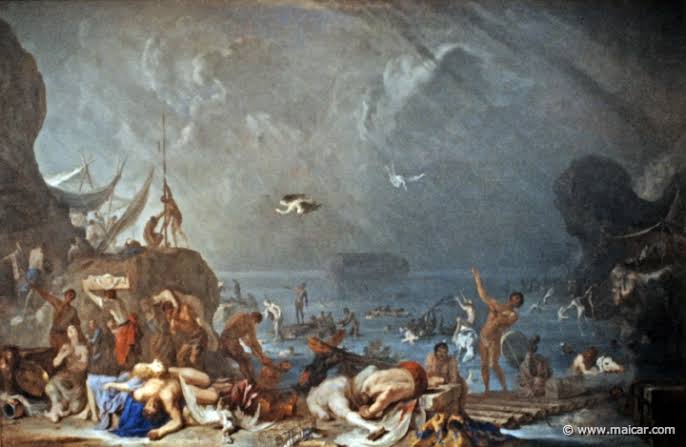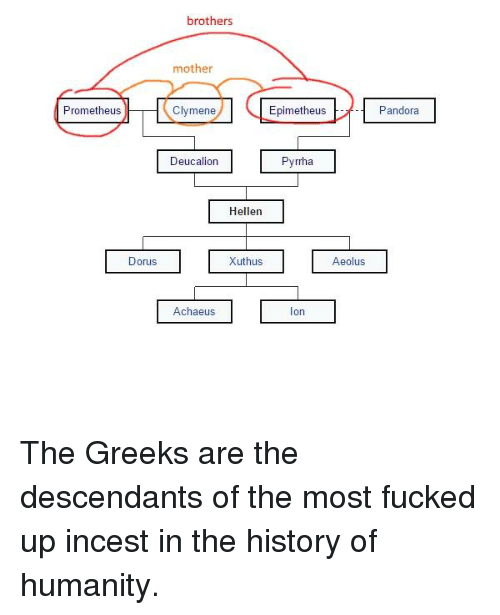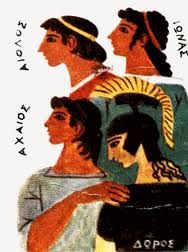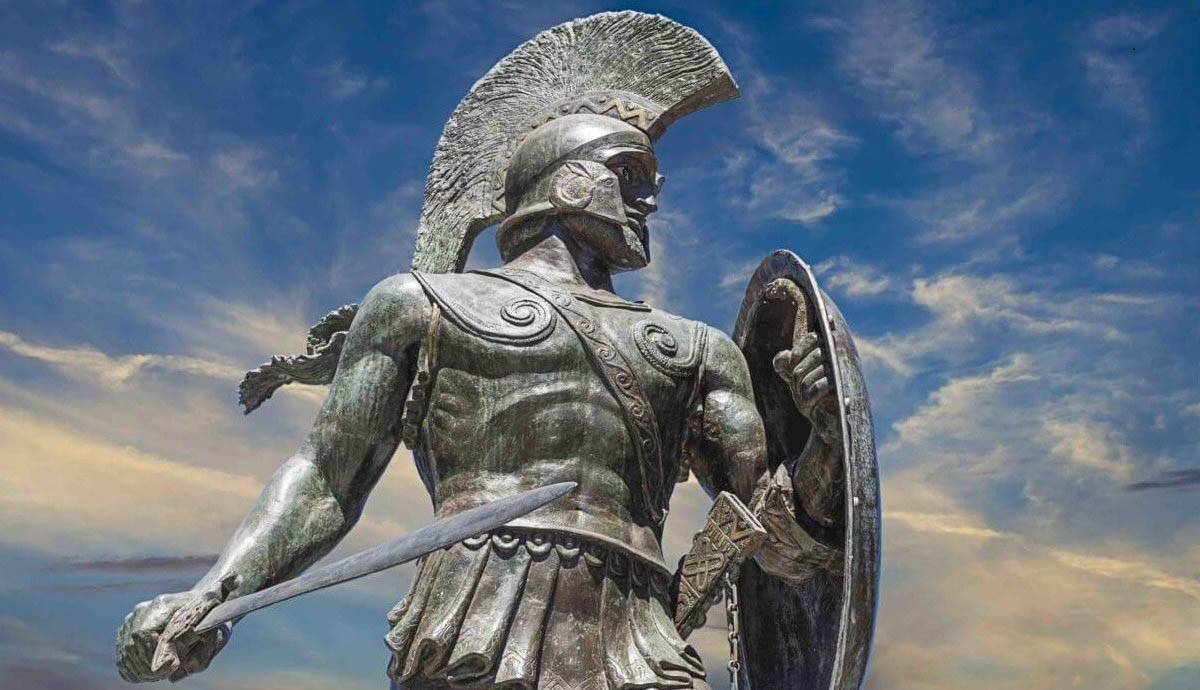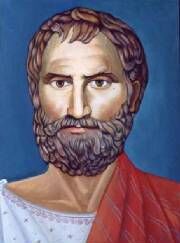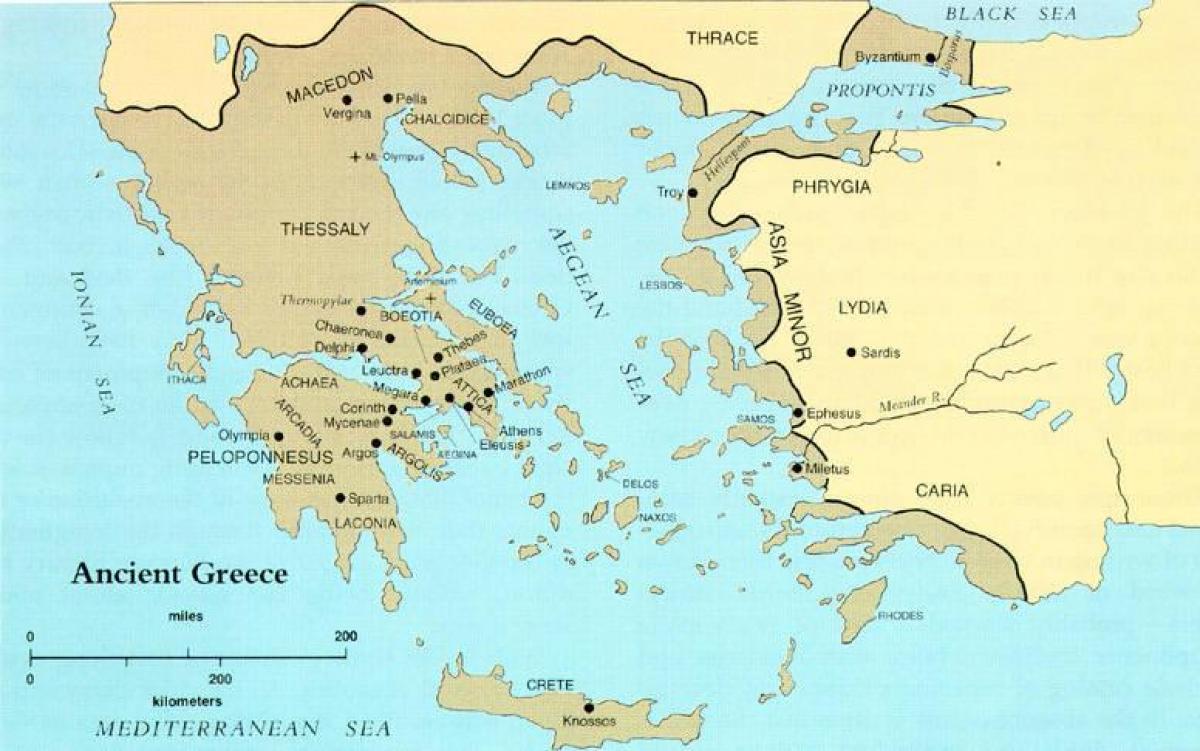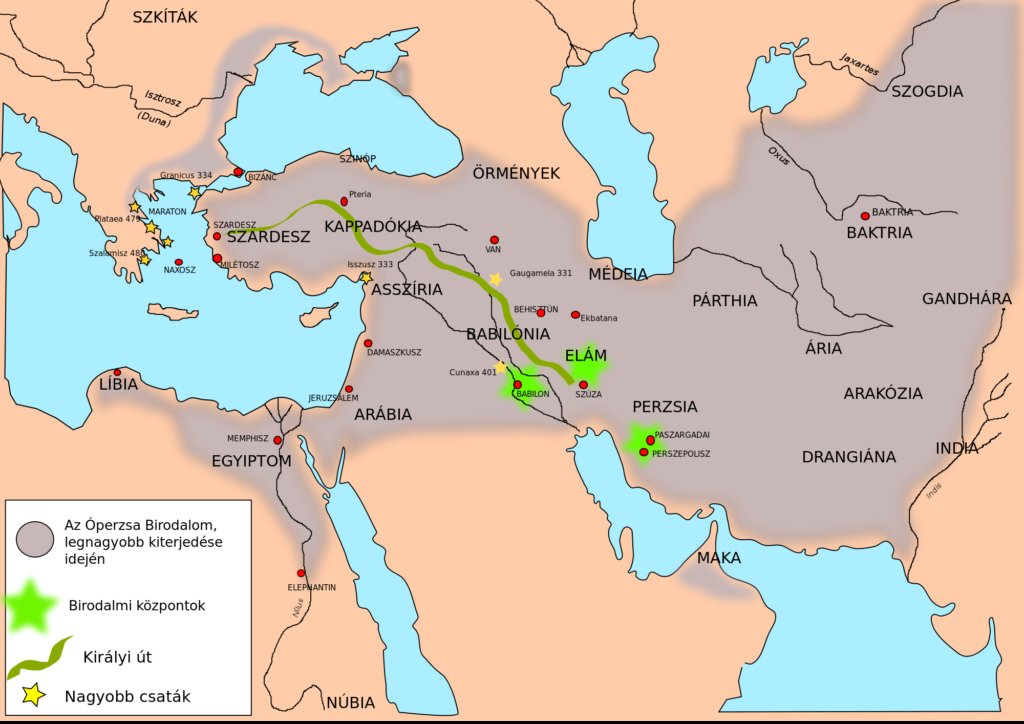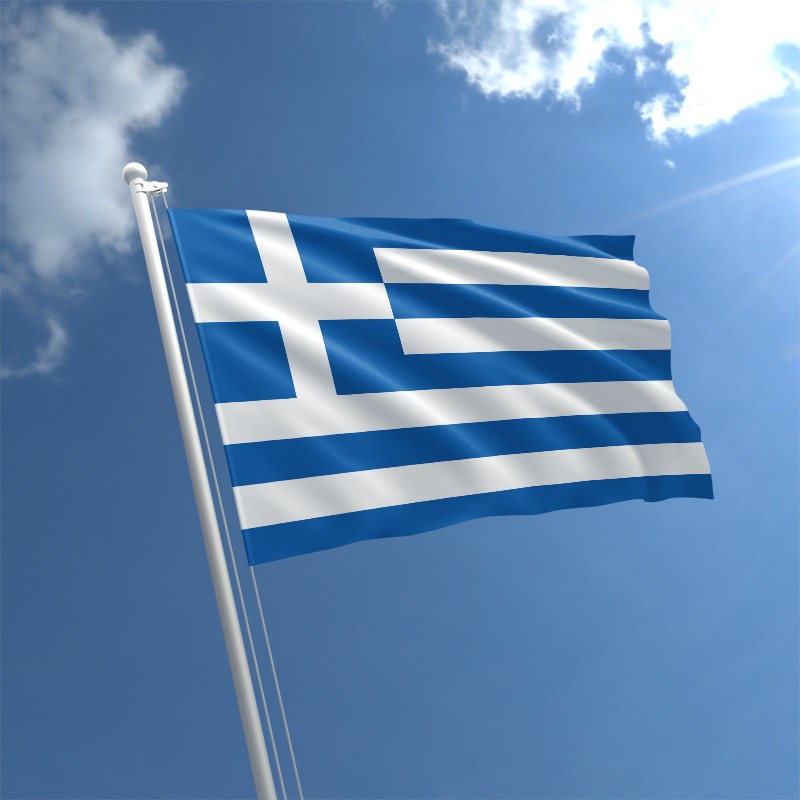[QUICK THREAD: THE YAVANAS]
1/22
Long, long ago, a people inhabited the regions around the Aegean Sea — Roughly what& #39;s today Greece and western Turkey. They were called the Pelasgians. Classical Greek folks like Homer called them, often reverentially, their ancestors.
1/22
Long, long ago, a people inhabited the regions around the Aegean Sea — Roughly what& #39;s today Greece and western Turkey. They were called the Pelasgians. Classical Greek folks like Homer called them, often reverentially, their ancestors.
2/22
One day, upset over something their king did, Zeus unleashed upon the world a mega flood to wipe the slate clean. Everyone died. Except Deucalion and his wife Pyrrha. Deucalion had built a boat to wait out the deluge. Later, the couple had a child.
His name, Hellen.
One day, upset over something their king did, Zeus unleashed upon the world a mega flood to wipe the slate clean. Everyone died. Except Deucalion and his wife Pyrrha. Deucalion had built a boat to wait out the deluge. Later, the couple had a child.
His name, Hellen.
3/22
Hellen went on to court a water-nymph and together they had 3 sons, Dorus, Xuthus, and Aeolus. Dorus and Aeolus went on to spawn 2 primordial tribes of the region, namely Dorians and Aeolians, respectively. Xuthus further had 2 sons, Achaeus and Ion.
Hellen went on to court a water-nymph and together they had 3 sons, Dorus, Xuthus, and Aeolus. Dorus and Aeolus went on to spawn 2 primordial tribes of the region, namely Dorians and Aeolians, respectively. Xuthus further had 2 sons, Achaeus and Ion.
4/22
Achaeus and Ion spawned their tribes too, the Achaeans and the Ionians. Thus came into being the 4 founding tribes of Ancient Greece — the Dorians, the Aeolians, the Achaeans, and the Ionians.
Of course, this is all just an etiological myth but the 4 tribes, they& #39;re real.
Achaeus and Ion spawned their tribes too, the Achaeans and the Ionians. Thus came into being the 4 founding tribes of Ancient Greece — the Dorians, the Aeolians, the Achaeans, and the Ionians.
Of course, this is all just an etiological myth but the 4 tribes, they& #39;re real.
5/22
The Dorians populated much of what& #39;s today western Greece along with a few tiny Islands in the Aegean Sea. The Ionians and Aeolians went to the other side and populated what& #39;s today the west coast of Turkey. And the Achaeans picked a tiny enclave surrounded by the Dorians.
The Dorians populated much of what& #39;s today western Greece along with a few tiny Islands in the Aegean Sea. The Ionians and Aeolians went to the other side and populated what& #39;s today the west coast of Turkey. And the Achaeans picked a tiny enclave surrounded by the Dorians.
6/22
Of these, the Dorians and the Ionians didn& #39;t seem to get along very well. We know this because once they even went to war and stayed at it for almost 3 decades!
It& #39;s called the Peloponnesian War and ran between 431 and 404 BC.
The Dorians won this round.
Of these, the Dorians and the Ionians didn& #39;t seem to get along very well. We know this because once they even went to war and stayed at it for almost 3 decades!
It& #39;s called the Peloponnesian War and ran between 431 and 404 BC.
The Dorians won this round.
7/22
This war is important and sets the stage for future plot development. The Dorians were led by battle-hardened Sparta and the Ionians by the naval kingpin Athens. The conflict ended in a Dorian victory and a much amplified Spartan clout.
This war is important and sets the stage for future plot development. The Dorians were led by battle-hardened Sparta and the Ionians by the naval kingpin Athens. The conflict ended in a Dorian victory and a much amplified Spartan clout.
8/22
While Dorians gave the region its best warriors, it& #39;s Ionia that birthed the fabled Greek Philosophy in the 6th century BC through Thales of Miletus. Later additions to this legacy include more familiar name like Heraclitus, Socrates, Plato, and Aristotle.
While Dorians gave the region its best warriors, it& #39;s Ionia that birthed the fabled Greek Philosophy in the 6th century BC through Thales of Miletus. Later additions to this legacy include more familiar name like Heraclitus, Socrates, Plato, and Aristotle.
9/22
Now, Aristotle died around 322 BC. And before he did, he wrote a few books. One of them was Meteorologica, a treatise on air, water, and their effects on weather. It& #39;s in this text that the name Graeci makes a debut, mostly as a reference to the western parts of the region.
Now, Aristotle died around 322 BC. And before he did, he wrote a few books. One of them was Meteorologica, a treatise on air, water, and their effects on weather. It& #39;s in this text that the name Graeci makes a debut, mostly as a reference to the western parts of the region.
10/22
During Aristotle& #39;s time, the whole region inhabited by the 4 tribes was collectively referred to as Hellas, after their mythological patriarch Hellen. But at some point in the past, he wrote in Meteorologica, the western reaches were called Graecus and its people, Graeci.
During Aristotle& #39;s time, the whole region inhabited by the 4 tribes was collectively referred to as Hellas, after their mythological patriarch Hellen. But at some point in the past, he wrote in Meteorologica, the western reaches were called Graecus and its people, Graeci.
11/22
Now, if Graecus sounds like Latin, it& #39;s probably because it is. Graîa was an ancient city on the cost of what& #39;s today Boeotia in Central Greece. This city is often said to be the oldest in all of Greece, Aristotle claimed it was built before the Great Flood.
Now, if Graecus sounds like Latin, it& #39;s probably because it is. Graîa was an ancient city on the cost of what& #39;s today Boeotia in Central Greece. This city is often said to be the oldest in all of Greece, Aristotle claimed it was built before the Great Flood.
12/22
And it& #39;s Graîa where the Romans first encountered the Hellenic peoples for the first time. They called these inhabitants Graeci and the region, Graecus. It& #39;s this name that, with time, corrupted to and entered English as Greece.
And it& #39;s Graîa where the Romans first encountered the Hellenic peoples for the first time. They called these inhabitants Graeci and the region, Graecus. It& #39;s this name that, with time, corrupted to and entered English as Greece.
13/22
But that& #39;s not where the etymological saga ends. Hellas, the name drawn from Hellen and in currency during Aristotle, still continues to be the country& #39;s official name as Helliniki Dimokratia or Hellenic Republic.
The story still doesn& #39;t end though.
But that& #39;s not where the etymological saga ends. Hellas, the name drawn from Hellen and in currency during Aristotle, still continues to be the country& #39;s official name as Helliniki Dimokratia or Hellenic Republic.
The story still doesn& #39;t end though.
14/22
Remember the Peloponnesian War of the 4th century BC? We know the Dorians won that round because they had Sparta. But Sparta is overrated. And that isn& #39;t the complete picture.
Much of their victory goes to help from a much stronger neighbor of Ionia.
The Persians.
Remember the Peloponnesian War of the 4th century BC? We know the Dorians won that round because they had Sparta. But Sparta is overrated. And that isn& #39;t the complete picture.
Much of their victory goes to help from a much stronger neighbor of Ionia.
The Persians.
15/22
Persia those days was under the great Achaemenid Empire, also known as the First Persian Empire. Founded by Cyrus the Great, the dynasty boasted of names like Darius and Xerxes. Their role in the Peloponnesian War proved rewarding as it bright Ionia under their control.
Persia those days was under the great Achaemenid Empire, also known as the First Persian Empire. Founded by Cyrus the Great, the dynasty boasted of names like Darius and Xerxes. Their role in the Peloponnesian War proved rewarding as it bright Ionia under their control.
16/22
This resulted in the first ever sustained interaction between the Persians and the Ionians. Since they spoke vastly different tongues, much vocabulary exchange followed. As did lexical corruption. Ionia became Yūnān in whatever it is the Persians spoke at the time.
This resulted in the first ever sustained interaction between the Persians and the Ionians. Since they spoke vastly different tongues, much vocabulary exchange followed. As did lexical corruption. Ionia became Yūnān in whatever it is the Persians spoke at the time.
17/22
Now the Ionians weren& #39;t the only Greeks, there were also Dorians, Achaeans, and Aeolians. But since they were the only ones most Persians ever met, Yūnān became the colloquial name for all of Greece. And all Greeks were Yūnāni.
Now the Ionians weren& #39;t the only Greeks, there were also Dorians, Achaeans, and Aeolians. But since they were the only ones most Persians ever met, Yūnān became the colloquial name for all of Greece. And all Greeks were Yūnāni.
18/22
The Persians those days were voracious readers. And translators. Remeber, it& #39;s the Ionians that produced nearly the entirety of Greek scholarship at the time. This fascinated the Persians to no end who wasted no time translating everything they could get their hands on.
The Persians those days were voracious readers. And translators. Remeber, it& #39;s the Ionians that produced nearly the entirety of Greek scholarship at the time. This fascinated the Persians to no end who wasted no time translating everything they could get their hands on.
19/22
One of the Ionian gentlemen they translated was Hippocrates, father of medicine. Translating his work gave the Persians access to an enormous body of work in the field of medicine. They refined it further and a new medical system largely based on it emerged.
Ūnāni.
One of the Ionian gentlemen they translated was Hippocrates, father of medicine. Translating his work gave the Persians access to an enormous body of work in the field of medicine. They refined it further and a new medical system largely based on it emerged.
Ūnāni.
20/22
Later when the Persians came in contact with the Indian subcontinent, this Ionian system of medicine came with them. That& #39;s why despite its Greek origins, Ūnāni medicine is still seen as Islamic today. Although do note that there was no Islam back in the day.
Later when the Persians came in contact with the Indian subcontinent, this Ionian system of medicine came with them. That& #39;s why despite its Greek origins, Ūnāni medicine is still seen as Islamic today. Although do note that there was no Islam back in the day.
21/22
Thanks to this Persian contact Indians came to see Ionian and Greek as synonymous. The name Yavan (यवन), a corruption of Ionian, entered the Sanskrit lexicon around 250 BC.
By the time Alexander crossed the Indus, Yavan was a generic term for any White-skinned invader.
Thanks to this Persian contact Indians came to see Ionian and Greek as synonymous. The name Yavan (यवन), a corruption of Ionian, entered the Sanskrit lexicon around 250 BC.
By the time Alexander crossed the Indus, Yavan was a generic term for any White-skinned invader.
22/22
So that& #39;s the story of how the Greeks came to be known by such a wide array of names in different parts of the world.
Greek, Hellenic, Yūnāni, Yavan — each as authentic as the other three.
So that& #39;s the story of how the Greeks came to be known by such a wide array of names in different parts of the world.
Greek, Hellenic, Yūnāni, Yavan — each as authentic as the other three.

 Read on Twitter
Read on Twitter![[QUICK THREAD: THE YAVANAS]1/22Long, long ago, a people inhabited the regions around the Aegean Sea — Roughly what& #39;s today Greece and western Turkey. They were called the Pelasgians. Classical Greek folks like Homer called them, often reverentially, their ancestors. [QUICK THREAD: THE YAVANAS]1/22Long, long ago, a people inhabited the regions around the Aegean Sea — Roughly what& #39;s today Greece and western Turkey. They were called the Pelasgians. Classical Greek folks like Homer called them, often reverentially, their ancestors.](https://pbs.twimg.com/media/EiTik8_UwAESyvT.jpg)
